Scientific Planning Committee
Hesham Elsharkawy, MD, MBA, MSc, FASA; MetroHealth, Cleveland, OH
Hance Clarke, MD, PhD; Toronto General Hospital, Toronto, Canada
Nabil Elkassabany, MD, MSCE, MBA; University of Virginia, Charlottesville, VA
Edward R. Mariano, MD, MAS, FASA; Stanford University School of Medicine, Stanford, CA
Samer Narouze, MD, PhD; Western Reserve Hospital, Cuyahoga Falls, OH
Shalini Shah, MD, MBA; University of California Irvine Health, Irvine, CA
Faculty
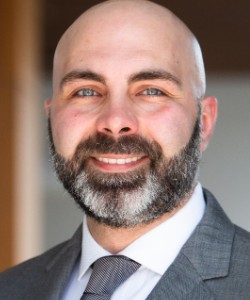
Rany Abdallah, MD, PhD, MBA, is president of Apico Pain Managment in Wilmington, DE. He completed his medical degree and PhD studies at the Medical University of South Carolina, his anesthesia residency at Rush University in Chicago, and his pain medicine fellowship at the University of Pittsburgh.
Dr. Abdallah is board certified in anesthesiology and pain medicine. He served as faculty at Temple University Health and chief of the interventional pain division at the University of Vermont Health.
 Kimberlee Bayless, DNP, FNP-BC, is a nurse practitioner and director of the transitional pain service department at George E.
Wahlen Department of Veterans Affairs Medical Center in Salt Lake City, Utah. Dr. Bayless has practiced pain medicine for multiple years in the private practice setting and has been a nurse for over 22 years in the private, hospital and academic setting.
Kimberlee Bayless, DNP, FNP-BC, is a nurse practitioner and director of the transitional pain service department at George E.
Wahlen Department of Veterans Affairs Medical Center in Salt Lake City, Utah. Dr. Bayless has practiced pain medicine for multiple years in the private practice setting and has been a nurse for over 22 years in the private, hospital and academic setting.
Dr. Bayless is a member of the office of nursing service pain management field advisory committee. She is vice chair of the Nurse Practitioner, Physician Assistant, and Clinical Nurse Special Interest Group for ASRA Pain Medicine. In 2019, Dr. Bayless received Secretary’s Ward Excellence in Nursing award for the George E. Wahlen Department of Veterans Affairs Medical Center. She also received the 2022 Utah State Award for Excellence from the American Association of Nurse Practitioners.
 Michael “Jay” Buys, MD, is an anesthesiologist and associate professor at the University of Utah and the Salt Lake
City (SLC) VA Medical Center. He specializes in acute pain and regional anesthesia and is the chief of the acute and transitional pain services at the Salt Lake City VA.
Michael “Jay” Buys, MD, is an anesthesiologist and associate professor at the University of Utah and the Salt Lake
City (SLC) VA Medical Center. He specializes in acute pain and regional anesthesia and is the chief of the acute and transitional pain services at the Salt Lake City VA.
Dr. Buys instituted a novel transitional pain service at the SLC VA in 2018 that implements a multidisciplinary pain and addiction focused perioperative surgical home approach to caring for veterans having surgery. In his spare time, you can find Dr.
Buys on the river chasing fish with his fly rod or hanging out with his cows.
 David Clark, MD, PhD, is professor and vice chair for academic affairs in the department of anesthesiology at Stanford University in Stanford, CA. His clinical practice is devoted to surgical transitional
pain management. Dr. Clark runs a research laboratory where projects are directed at understanding the mechanisms driving persistent pain after surgery, fractures, joint damage, intervertebral disc injury, and traumatic brain injury.
David Clark, MD, PhD, is professor and vice chair for academic affairs in the department of anesthesiology at Stanford University in Stanford, CA. His clinical practice is devoted to surgical transitional
pain management. Dr. Clark runs a research laboratory where projects are directed at understanding the mechanisms driving persistent pain after surgery, fractures, joint damage, intervertebral disc injury, and traumatic brain injury.
In addition, Dr. Clark is involved in various clinical trials assessing the efficacy and effectiveness of non-pharmacological treatments for chronic pain.
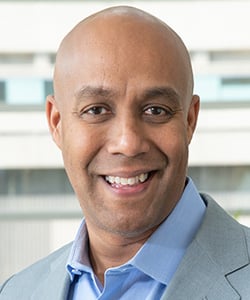 Hance Clarke, MD, PhD, is the director of pain services and the pain research unit at Toronto General Hospital in Canada. He is the knowledge translation chair for the University of Toronto Centre for the
Study of Pain and an associate professor in the department of anesthesiology and pain medicine at the University of Toronto.
Hance Clarke, MD, PhD, is the director of pain services and the pain research unit at Toronto General Hospital in Canada. He is the knowledge translation chair for the University of Toronto Centre for the
Study of Pain and an associate professor in the department of anesthesiology and pain medicine at the University of Toronto.
Dr. Clarke has authored more than 150 peer-reviewed publications and has been invited to speak on pain control, cannabis, and the opioid crisis to the House of Commons in Ottawa, Canada, and elsewhere around the world. In the spring of 2022, he became the president-elect of the Canadian Pain Society.
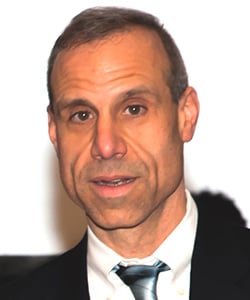 Steven P. Cohen, MD, is professor of anesthesiology and critical care medicine, neurology, physical medicine rehabilitation,
and psychiatry and behavioral sciences at the Johns Hopkins School of Medicine and Uniformed Services University of the Health Sciences in Baltimore, MD. He is also chief of pain medicine and director of pain operations at Johns Hopkins and director
of pain research at Walter Reed National Military Medical Center.
Steven P. Cohen, MD, is professor of anesthesiology and critical care medicine, neurology, physical medicine rehabilitation,
and psychiatry and behavioral sciences at the Johns Hopkins School of Medicine and Uniformed Services University of the Health Sciences in Baltimore, MD. He is also chief of pain medicine and director of pain operations at Johns Hopkins and director
of pain research at Walter Reed National Military Medical Center.
Dr. Cohen has published more than 400 peer-reviewed articles and book chapters and was listed by ExpertScape as the leading or second leading pain expert in the world during the past three years.

Beth Darnall, PhD, is professor at Stanford University's School of Medicine, department of anesthesiology, perioperative, and pain medicine where she directs the Stanford Pain Relief Innovations Lab. Her pain treatment research is funded by the National Institutes of Health and the Patient-Centered Outcomes Research Institute. Her work involves brief, digital, scalable, and home-based analgesic interventions. She is creator of Empowered Relief, an evidence-based, one-session, skills-based intervention for acute/surgical pain and chronic pain that is delivered in 16 countries and 7 languages.
Dr. Darnall has briefed the U.S. Congress and the Food and Drug Administration three times on patient-centered pain care and opioid stewardship. She is a scientific member of the National Institutes of Health Interagency Pain Research Coordinating Committee, and served as a scientific member of the Centers for Disease Control and Prevention's Opioid Workgroup (2021). She is chief science advisor for AppliedVR, serves on the board of directors of the American Academy of Pain Medicine, and is on the medical advisory board of the Facial Pain Association.
Her work has been featured in outlets such as Scientific American, The Guardian (Australia), NPR Radio, BBC Radio, The New York Times, and Nature. She has authored five books for patients and clinicians. In 2018, Dr. Darnall spoke on the psychology of pain relief at the World Economic Forum in Davos, Switzerland.
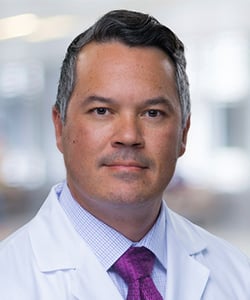 Maxim Eckmann, MD, is the Ramamurthy Endowed Professor of Pain Medicine and interim chair of the department of anesthesiology
at University of Texas Health San Antonio. Dr. Eckmann has been an academic pain physician since 2008 and has served many societies and entities in a leadership capacity. He is past president of the Texas Pain Society, co-chair of the ASRA
Pain Medicine CME Committee, past chair of the American Society of Anesthesiologists' Pain Education Track Subcommittee, examiner for the American Board of Anesthesiologists, and chief executive officer for iKare Mood Trauma and Recovery Clinic.
Maxim Eckmann, MD, is the Ramamurthy Endowed Professor of Pain Medicine and interim chair of the department of anesthesiology
at University of Texas Health San Antonio. Dr. Eckmann has been an academic pain physician since 2008 and has served many societies and entities in a leadership capacity. He is past president of the Texas Pain Society, co-chair of the ASRA
Pain Medicine CME Committee, past chair of the American Society of Anesthesiologists' Pain Education Track Subcommittee, examiner for the American Board of Anesthesiologists, and chief executive officer for iKare Mood Trauma and Recovery Clinic.
Dr. Eckmann has served as the director of translational research and vice chair of clinical research for his department. His special interests include joint denervation and neuroanatomy, central and peripheral neuromodulation, medical education, and executive health leadership.
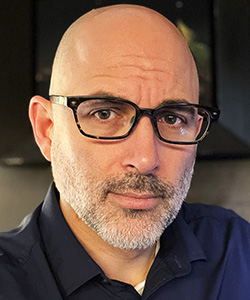
David A. Edwards, MD, PhD, is associate professor of anesthesiology and neurological surgery and chief of the pain medicine division at Vanderbilt University Medical Center in Nashville, TN. He oversees care of patients in urban and rural specialty clinics that treat perioperative acute and chronic pain, cancer pain, pediatric pain, and substance use disorder.
Dr. Edwards' research program includes National Institutes of Health-funded investigations of outcomes after perioperative opioid exposure and trials in drug development of nonopioid options for treatment of pain and opioid use disorder. He teaches a course on pain, policy, and addiction at Vanderbilt Medical School where students learn to impact policy.
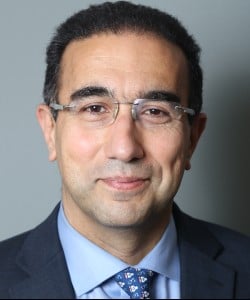 Nabil Elkassabany, MD, MSCE, MBA, is a professor of anesthesiology and the vice chair of clinical operations in the Department
of Anesthesiology at the University of Virginia at Charlottesville. Dr. Elkassabany did his undergraduate and medical education at Alexandria University in Alexandria, Egypt. He was appointed as faculty in the department of anesthesiology at Menoufia
University, Egypt. He completed his anesthesia residency training at the Cleveland Clinic in Cleveland, OH, and his regional anesthesia subspecialty training at the University of Florida at Gainesville. He earned a master’s degree in clinical
epidemiology and biostatistics in December 2012 from the Perelman School of Medicine at the University of Pennsylvania and his MBA in December 2021 from the Fox School of Business of Temple University in Philadelphia.
Nabil Elkassabany, MD, MSCE, MBA, is a professor of anesthesiology and the vice chair of clinical operations in the Department
of Anesthesiology at the University of Virginia at Charlottesville. Dr. Elkassabany did his undergraduate and medical education at Alexandria University in Alexandria, Egypt. He was appointed as faculty in the department of anesthesiology at Menoufia
University, Egypt. He completed his anesthesia residency training at the Cleveland Clinic in Cleveland, OH, and his regional anesthesia subspecialty training at the University of Florida at Gainesville. He earned a master’s degree in clinical
epidemiology and biostatistics in December 2012 from the Perelman School of Medicine at the University of Pennsylvania and his MBA in December 2021 from the Fox School of Business of Temple University in Philadelphia.
Dr. Elkassabany was the division chief of regional anesthesia and acute pain medicine at the University of Pennsylvania from 2010-2022. His research interest focuses on patients’ outcomes after orthopedic surgery, specifically patients who receive regional anesthesia in different clinical settings. He is especially interested in improving patient outcomes after major joint arthroplasty and defining the value added by regional anesthesia and acute pain medicine to patients’ perioperative experience. Dr. Elkassabany is a member of the ASRA Pain Medicine Board of Directors. He also chairs the educational track subcommittee on regional anesthesia and acute pain at the American Society of Anesthesiologists.
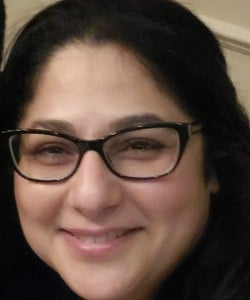 Dalia Elmofty, MD, is an associate professor and associate program director for the pain fellowship at the University of Chicago
in Illinois. During these years, she has continued to commit her time towards the education of residents and fellows being involved in educational sessions at conferences locally, regionally, and nationally. She has authored and co-authored several
book chapters and peer-reviewed publications. She is president-elect for the Midwest Pain Society, chair of the educational track committee on pain medicine for American Society of Anesthesiologists, and chair of the ASRA Pain Medicine newsletter
committee and Women in Regional Anesthesia and Pain Medicine Special Interest Group.
Dalia Elmofty, MD, is an associate professor and associate program director for the pain fellowship at the University of Chicago
in Illinois. During these years, she has continued to commit her time towards the education of residents and fellows being involved in educational sessions at conferences locally, regionally, and nationally. She has authored and co-authored several
book chapters and peer-reviewed publications. She is president-elect for the Midwest Pain Society, chair of the educational track committee on pain medicine for American Society of Anesthesiologists, and chair of the ASRA Pain Medicine newsletter
committee and Women in Regional Anesthesia and Pain Medicine Special Interest Group.
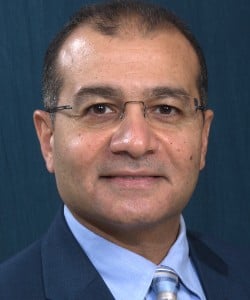 Hesham Elsharkawy, MD, MBA, MSc, FASA,
is a staff member at MetroHealth and associate professor at Case Western Reserve University in Cleveland, OH. Dr. Elsharkawy’s research focus has been on development of new technologies, new pain procedures, and the transition from acute
to chronic pain. This interest led him to establish the Persistent Perioperative Pain Special Interest Group. He has experience in research, has contributed to the field of regional anesthesia, and has been invited to many lectures and workshops,
in national and international conferences, and on numerous grand rounds.
Hesham Elsharkawy, MD, MBA, MSc, FASA,
is a staff member at MetroHealth and associate professor at Case Western Reserve University in Cleveland, OH. Dr. Elsharkawy’s research focus has been on development of new technologies, new pain procedures, and the transition from acute
to chronic pain. This interest led him to establish the Persistent Perioperative Pain Special Interest Group. He has experience in research, has contributed to the field of regional anesthesia, and has been invited to many lectures and workshops,
in national and international conferences, and on numerous grand rounds.
Dr. Elsharkawy is also actively involved in multiple research projects and multicenter studies and has received multiple grants to support research projects. The core of his educational activities is teaching residents and fellows in different clinical settings, as well as during formal lectures, journal clubs, simulation sessions, workshops, and problem-based learning discussions. He earned an MBA from Cleveland State University, which helps him to lead many departmental projects.
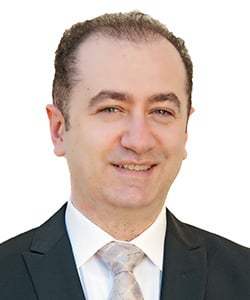 Yashar Eshraghi, MD, is the program director for the pain medicine fellowship training program at Ochsner Medical Center
in New Orleans, LA. He is board-certified in anesthesiology, chronic pain, and headache management. Dr. Eshraghi is an associate professor in the department of anesthesiology and critical care medicine at Ochsner Health System University of
Queensland Ochsner Medical School and clinical assistant professor at Louisiana State University School of Medicine.
Yashar Eshraghi, MD, is the program director for the pain medicine fellowship training program at Ochsner Medical Center
in New Orleans, LA. He is board-certified in anesthesiology, chronic pain, and headache management. Dr. Eshraghi is an associate professor in the department of anesthesiology and critical care medicine at Ochsner Health System University of
Queensland Ochsner Medical School and clinical assistant professor at Louisiana State University School of Medicine.
Dr. Eshraghi trained during residency in the department of anesthesiology at Case Western Reserve University/MetroHealth Medical Center in 2015. Thereafter, he pursued chronic fellowship program in pain medicine at the Cleveland Clinic Foundation. Dr. Eshraghi has contributed towards the building of a multitude of educational, clinical, and scholarly endeavors at the departmental, institutional, and national level. He led several clinical trials in the field of chronic pain as principal investigator.
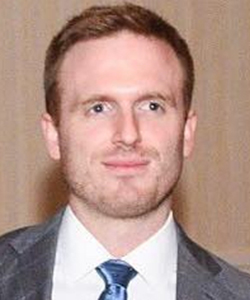
John Finneran, MD, is an associate professor in the department of anesthesiology and division of regional anesthesia and acute pain at University of California, San Diego (UCSD). He completed his residency and fellowship training at UCSD and now serves as the associate program director of the UCSD Anesthesiology Residency Program.
Dr. Finneran has published more than 60 peer-reviewed articles and book chapters in sources such as Anesthesiology, Regional Anesthesia & Pain Medicine, Anesthesia & Analgesia, and Morgan & Mikhail's Clinical Anesthesiology. His research areas of interest include regional anesthesia in trauma and burn populations, phantom limb pain, and cryoneurolysis and electrical stimulation of peripheral nerves for acute pain. He is here today to tell us about some of his recent work on cryoneurolysis of peripheral nerves for postoperative pain following split-thickness skin grafting in burn patients.
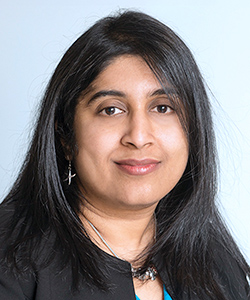 Padma Gulur, MD, is recognized for her work in acute and chronic pain management. Her research and practice focuses on
the safe delivery of pain management services for high risk populations, including opioid tolerant and pediatric patients.
Padma Gulur, MD, is recognized for her work in acute and chronic pain management. Her research and practice focuses on
the safe delivery of pain management services for high risk populations, including opioid tolerant and pediatric patients.
Dr. Gulur is known for her development of pain assessment tools and her investigation of risk factors and risk reduction methodologies utilized to improve patient outcomes. The goal of Dr. Gulur’s practice and research is to improve the quality of life for her patients, especially for patients who are at high risk.
 Jennifer Hah, MD, MS, is triple boarded in anesthesiology, pain medicine, and addiction medicine. She is an assistant
professor in the department of anesthesiology, perioperative, and pain medicine at Stanford University in Stanford, CA. She has practiced pain medicine over a decade educating trainees and clinicians in ultrasound-guided interventions, neuromodulation,
and evidence-based treatments at the cutting edge.
Jennifer Hah, MD, MS, is triple boarded in anesthesiology, pain medicine, and addiction medicine. She is an assistant
professor in the department of anesthesiology, perioperative, and pain medicine at Stanford University in Stanford, CA. She has practiced pain medicine over a decade educating trainees and clinicians in ultrasound-guided interventions, neuromodulation,
and evidence-based treatments at the cutting edge.
As a clinical epidemiologist and physician-scientist, she leads National Institutes of Health-funded research at the intersection between mood, pain, and medication use, specifically characterizing risk factors for persistent pain and opioid use after surgery and developing interventions to encourage postoperative opioid cessation. She is the director of the Stanford pelvic pain program with a clinical focus on treating both men and women suffering from a wide range of conditions including endometriosis, pelvic floor myalgias, vulvodynia, and painful bladder syndrome.
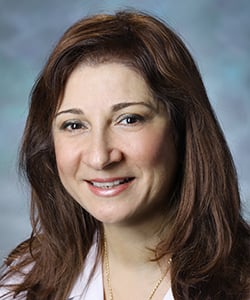 Marie Hanna, MD, MEHP, is an associate professor of anesthesiology and chief division of regional anesthesia and
acute pain medicine at Johns Hopkins Hospital in Baltimore, MD. She has 24 years of experience in building clinical and educational programs.
Marie Hanna, MD, MEHP, is an associate professor of anesthesiology and chief division of regional anesthesia and
acute pain medicine at Johns Hopkins Hospital in Baltimore, MD. She has 24 years of experience in building clinical and educational programs.
In 2017, Dr. Hanna initiated an innovative perioperative, personalized pain program (PPP) for chronic opioid users that adds value to patient care by improving perioperative pain control and tapering opioid. She has received multiple awards and participated as a speaker at multiple national and international conferences. She is a principal investigator in an R01/Centers for Disease Control and Prevention grant to promote her work in the PPP. Dr Hanna’s plan is to disseminate the idea of the PPP to many institutions and provide hope to many opioid-dependent patients.
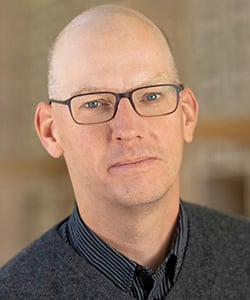
Kyle Harrison, MD, completed his medical degree and residency training at Stanford University in Stanford, CA. He is board certified in anesthesiology and addiction medicine. He practices at the VA Palo Alto Health Care System where he attends on the acute pain, transitional pain, and addiction medicine services, in addition to his operating-room-based anesthesia practice.
 Brian Ilfeld, MD, MS, completed medical school and residency at the University of California
San Francisco. He completed a regional fellowship and earned his master of science degree in clinical investigation at the University of Florida in Gainesville.
Brian Ilfeld, MD, MS, completed medical school and residency at the University of California
San Francisco. He completed a regional fellowship and earned his master of science degree in clinical investigation at the University of Florida in Gainesville.
Since 2006, Dr. Ilfeld's focus has been in clinical research at the University of California San Diego. He has received more than $10 million in career federal funding with current clinical research involving the treatment of both acute and chronic pain with ambulatory continuous peripheral nerve blocks, cryoneurolysis, and percutaneous peripheral nerve stimulation.
 Lynn Kohan, MD, is a professor of anesthesiology and pain medicine at the University of Virginia at Charlottesville. She
obtained her medical degree from Georgetown University, where she also completed her anesthesia residency. She completed her pain medicine fellowship at the University of Virginia and stayed on as faculty.
Lynn Kohan, MD, is a professor of anesthesiology and pain medicine at the University of Virginia at Charlottesville. She
obtained her medical degree from Georgetown University, where she also completed her anesthesia residency. She completed her pain medicine fellowship at the University of Virginia and stayed on as faculty.
Dr. Kohan currently serves as the pain management fellowship director. Her research and clinical interests include head and facial pain, novel radiofrequency techniques, medical and interventional treatments for acute and chronic pain, and resident/fellow education.
 Jody Leng, MD, MS, attended medical school at the University of Miami and completed her anesthesiology residency and regional
anesthesiology and acute pain medicine (RAAPM) fellowship at Stanford University in 2014. Prior to medical school, she studied and worked as a biomedical engineer for a medical device startup in the Bay Area. She has been an anesthesiology
attending with the amazing team and patients at VA Palo Alto since 2014 and currently serves as the Stanford RAAPM Fellowship Program Director, the VA Director of RAAPM, and the Stanford anesthesiology wellness program co-director.
Jody Leng, MD, MS, attended medical school at the University of Miami and completed her anesthesiology residency and regional
anesthesiology and acute pain medicine (RAAPM) fellowship at Stanford University in 2014. Prior to medical school, she studied and worked as a biomedical engineer for a medical device startup in the Bay Area. She has been an anesthesiology
attending with the amazing team and patients at VA Palo Alto since 2014 and currently serves as the Stanford RAAPM Fellowship Program Director, the VA Director of RAAPM, and the Stanford anesthesiology wellness program co-director.
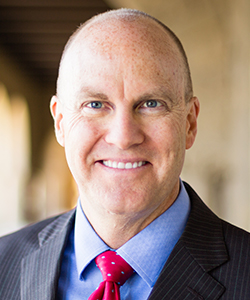 Sean Mackey, MD, PhD, is the Redlich Professor, division chief of pain medicine, associate vice chair for clinical
research, and director of the Systems Neuroscience and Pain Lab (SNAPL) at Stanford University in Stanford, CA. Dr. Mackey received his BSE and MSE in bioengineering from University of Pennsylvania, his PhD in electrical and computer engineering,
and his MD from the University of Arizona.
Sean Mackey, MD, PhD, is the Redlich Professor, division chief of pain medicine, associate vice chair for clinical
research, and director of the Systems Neuroscience and Pain Lab (SNAPL) at Stanford University in Stanford, CA. Dr. Mackey received his BSE and MSE in bioengineering from University of Pennsylvania, his PhD in electrical and computer engineering,
and his MD from the University of Arizona.
Under Dr. Mackey’s leadership, Stanford Pain Management Center has twice been designated a Center of Excellence by the American Pain Society. As director of SNAPL, his primary research interest involves the use of advanced research techniques such as functional and structural neuroimaging, psychophysics, and neurobehavioral assessment to investigate neural processing of pain and neuronal plasticity in patients with chronic pain. Currently, he is developer of a free, open-source learning health system, CHOIR (http://choir.stanford.edu). He has served as principal investigator for multiple National Institutes of Health (NIH) (P01, R01’s, R61, U01, K24, T32, R21) and foundation-sponsored grants to investigate mechanisms of chronic pain.
Dr. Mackey has published more than 300 journal articles and book chapters in addition to numerous national and international lectures. He co-authored Institute of Medicine’s report, Relieving Pain in America. He was co-chair of the Oversight Committee for NIH/Health and Human Services National Pain Strategy, an effort to establish a national health strategy for pain care, education, and research.
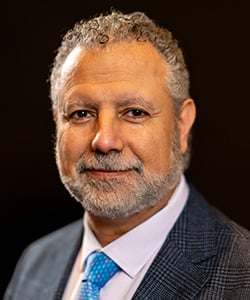 Samer Narouze, MD, PhD, is a professor of anesthesiology and surgery at NEOMED and Ohio University. He is board certified
in anesthesiology, pain medicine, headache medicine, and interventional pain management. He is the chairman of the Center for Pain Medicine at Western Reserve Hospital in Cuyahoga Falls, OH.
Samer Narouze, MD, PhD, is a professor of anesthesiology and surgery at NEOMED and Ohio University. He is board certified
in anesthesiology, pain medicine, headache medicine, and interventional pain management. He is the chairman of the Center for Pain Medicine at Western Reserve Hospital in Cuyahoga Falls, OH.
Dr. Narouze is the president of ASRA Pain Medicine. He founded the American Interventional Headache Society and serves on many committees for national and international headache and pain organizations. He has published about 200 research papers, review articles, book chapters, and abstracts. His areas of interest are pain, headache, cannabinoids, diversity and inclusion, wellness, obesity, and ultrasound.
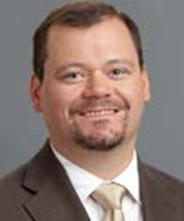
Einar Ottestad, MD, FIPP, CIPS, joined Stanford University as a faculty member in 2007 and became medical director of the acute pain service and the Stanford comprehensive interdisciplinary pain program in 2009. As such, he manages acute, postoperative pain; acute-on-chronic inpatient pain consults; and cancer pain at Stanford Hospital in Stanford, CA. He is committed to the Stanford Pain Center’s multidisciplinary, comprehensive approach when treating clinic patients with chronic pain.
Dr. Ottestad possesses expertise in neuromodulation and ultrasound-guided procedures in treatment of pain. He is the past president of World Academy of Pain Medicine United and its current international director. He is a member of the Board of Directors for World Academy of Pain Medicine United and the Pacific Spine and Pain Society and has been an annual course director for peripheral nerve stimulation for the North American Neuromodulation Society since 2018.
He is a faculty examiner for Fellow of Interventional Pain Practice and CIPS exams. Dr. Ottestad is a peer reviewer of multiple journals and is ultrasound section editor for the journal Pain Medicine. Dr. Ottestad has given more than 120 national lectures and 30 international lectures.
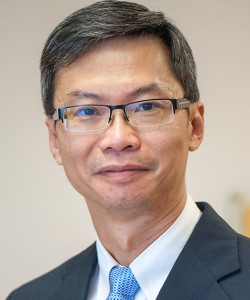 Philip Peng, MBBS, FRCPC, is a professor in the department of anesthesiology and pain medicine at University of Toronto
in Canada. He is a leader, researcher, educator, and pioneer in the application of ultrasound for pain medicine. He received founder status from Royal College for his work in establishment pain medicine as a subspecialty.
Philip Peng, MBBS, FRCPC, is a professor in the department of anesthesiology and pain medicine at University of Toronto
in Canada. He is a leader, researcher, educator, and pioneer in the application of ultrasound for pain medicine. He received founder status from Royal College for his work in establishment pain medicine as a subspecialty.
His innovative research led to different new procedures in pain intervention. He received numerous awards including the John J Bonica Award from ASRA Pain Medicine, the Distinguished Service Award from European Society of Regional Anaesthesia and Pain Therapy-Spain, and the Gold Medal Award from the Canadian Anesthesiology Society. He has delivered more than 400 lectures and workshops nationally and internationally. He has edited eight books and published 250 peer-reviewed publications and book chapters.
 Scott G. Pritzlaff MD, CIPS, FIPP, is an interventional pain specialist at University of California, Davis. He currently
serves as a clinical associate professor in the department of anesthesiology and program director for the pain medicine fellowship.
Scott G. Pritzlaff MD, CIPS, FIPP, is an interventional pain specialist at University of California, Davis. He currently
serves as a clinical associate professor in the department of anesthesiology and program director for the pain medicine fellowship.
After graduating from medical school at Georgetown University, Dr. Pritzlaff spent five years on active duty as a Naval physician. He completed his internship at the Walter Reed National Military Medical Center. From 2008-2010, he deployed twice to Iraq and Afghanistan with the 2nd Marine Aircraft Wing in support of coalition combat operations. He then finished anesthesiology training at the Massachusetts General Hospital followed by a clinical pain management fellowship at Stanford.
Dr. Pritzlaff’s research interests focus on use of ultrasound and emerging technologies to treat peripheral neuropathic pain. He is interested in developing novel uses of percutaneous peripheral nerve stimulation to treat chronic nerve pain.
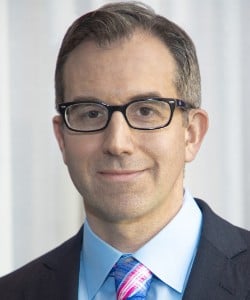 David Provenzano, MD, is president of Pain Diagnostics and Interventional Care in Pittsburgh, PA. He serves on the Executive
Committee of the Medical Staff, Western PA Surgery Center. He received his undergraduate degree from Colgate University where he graduated Magna Cum Laude and became a Phi Beta Kappa member. He received his medical degree from the University of
Rochester School of Medicine and Dentistry. He completed a surgical internship at Thomas Jefferson University Hospital and a residency in anesthesiology at The Western Pennsylvania Hospital. He completed pain management fellowship at the Dartmouth
Hitchcock Medical Center.
David Provenzano, MD, is president of Pain Diagnostics and Interventional Care in Pittsburgh, PA. He serves on the Executive
Committee of the Medical Staff, Western PA Surgery Center. He received his undergraduate degree from Colgate University where he graduated Magna Cum Laude and became a Phi Beta Kappa member. He received his medical degree from the University of
Rochester School of Medicine and Dentistry. He completed a surgical internship at Thomas Jefferson University Hospital and a residency in anesthesiology at The Western Pennsylvania Hospital. He completed pain management fellowship at the Dartmouth
Hitchcock Medical Center.
Dr. Provenzano has served as a principal investigator on multiple research studies and published numerous scientific articles. His research interests include neuromodulation and monopolar and bipolar radiofrequency lesioning. He has lectured at numerous international and national meetings on the management of acute and chronic pain. Furthermore, he serves as an external member of the Robert Morris University Institutional Review Board. He serves as president-elect on ASRA Pain Medicine Board of Directors.
Dr. Provenzano has extensive interests and expertise in the conservative treatment of pain originating from the cervical and lumbar spine, neuromodulation, and utilization of ultrasound for interventional pain management procedures.
 Kristin L. Schreiber, MD, PhD, is an associate professor at Harvard Medical School, and vice chair of faculty development
in the department of anesthesiology, perioperative, and pain Medicine at Brigham and Women’s Hospital in Boston, MA. She completed her MD and a PhD in neuroscience at the University of Minnesota, investigating reciprocal neural-immune interactions
involved in infection and the development of persistent pain. She completed residency training at the University of Pittsburgh, and fellowship at Brigham and Women’s Hospital, where she practices clinically as a regional anesthesiologist.
Kristin L. Schreiber, MD, PhD, is an associate professor at Harvard Medical School, and vice chair of faculty development
in the department of anesthesiology, perioperative, and pain Medicine at Brigham and Women’s Hospital in Boston, MA. She completed her MD and a PhD in neuroscience at the University of Minnesota, investigating reciprocal neural-immune interactions
involved in infection and the development of persistent pain. She completed residency training at the University of Pittsburgh, and fellowship at Brigham and Women’s Hospital, where she practices clinically as a regional anesthesiologist.
Dr. Schreiber's research program investigates the development of chronic pain after surgical injury, using psychosocial and psychophysical assessment tools, in addition to biomarkers, clinical characteristics, and socio-demographics, to predict who is most at risk. Her perioperative interventional studies incorporate this dense biopsychosocial assessment of individual patients into their design to allow more nuanced assessment of differential efficacy of preventive perioperative interventions among patients in order to ultimately inform more personalized care. In her quantitative sensory testing lab, she investigates differences in pain processing among individuals, including how subjective pain relates to changes in physiology and how pain may be modulated by non-opioid analgesic techniques, ranging from regional anesthetic techniques to music.
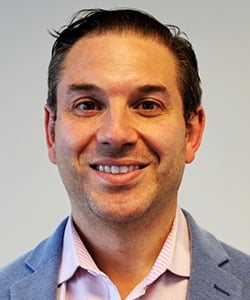 Gary Schwartz, MD, is the director of acute pain management at Maimonides Medical Center in Brooklyn, NY. He is board
certified in both pain management and anesthesiology. Dr. Schwartz completed an interventional pain fellowship at Mount Sinai School of Medicine, after finishing his anesthesia residency at St. Vincent's Hospital and Maimonides Medical Center.
He received his MD from the State University of New York Upstate College of Medicine and graduated Magna Cum Laude from Union College in Schenectady, NY.
Gary Schwartz, MD, is the director of acute pain management at Maimonides Medical Center in Brooklyn, NY. He is board
certified in both pain management and anesthesiology. Dr. Schwartz completed an interventional pain fellowship at Mount Sinai School of Medicine, after finishing his anesthesia residency at St. Vincent's Hospital and Maimonides Medical Center.
He received his MD from the State University of New York Upstate College of Medicine and graduated Magna Cum Laude from Union College in Schenectady, NY.
Dr. Schwartz focuses on back pain, neck pain, spinal cord stimulation, nerve pain, joint pain, and failed back surgery syndrome. At Maimonides Medical Center, Dr. Schwartz focuses on assisting hospitalized patients with postoperative pain and also educates anesthesia residents and medical school students. Dr. Schwartz also serves as a committee member for ASRA Pain Medicine and the American Society of Anesthesiologists.
 Eric Schwenk, MD, is a fellowship-trained regional anesthesiologist and acute
pain physician at Jefferson University in Philadelphia, PA. Dr. Schwenk is a member of the research committee and guidelines/regulatory advocacy committee for ASRA Pain Medicine. His academic interests are ketamine for refractory headache,
perioperative ketamine and adverse effects, perioperative management of total joint arthroplasty, and social media in medicine.
Eric Schwenk, MD, is a fellowship-trained regional anesthesiologist and acute
pain physician at Jefferson University in Philadelphia, PA. Dr. Schwenk is a member of the research committee and guidelines/regulatory advocacy committee for ASRA Pain Medicine. His academic interests are ketamine for refractory headache,
perioperative ketamine and adverse effects, perioperative management of total joint arthroplasty, and social media in medicine.
 Shalini Shah, MD, MBA, is a professor and vice chair for the department of anesthesiology and perioperative care and
enterprise director of pain services for University of California Irvine Health. Dr. Shah completed her residency in anesthesiology from Cornell University and a combined fellowship in adult and pediatric chronic pain at Harvard Medical
School.
Shalini Shah, MD, MBA, is a professor and vice chair for the department of anesthesiology and perioperative care and
enterprise director of pain services for University of California Irvine Health. Dr. Shah completed her residency in anesthesiology from Cornell University and a combined fellowship in adult and pediatric chronic pain at Harvard Medical
School.
Dr. Shah has been featured in Time Magazine, The Doctors, NBC Nightly News, and Business Insider, and she is a frequent guest on NPR on the topic of safe pain care options. Dr. Shah currently serves as the founding chair, committee of pain medicine at the California Society of Anesthesiologists and is president of the California Society of Interventional Pain Physicians. She completed her MBA from UCLA Anderson School of Management with a certificate of distinction in finance and entrepreneurship.
Dr. Shah is strongly committed to pain advocacy and healthcare regulatory reform both in the state of California and nationally to improve healthcare experiences for patients.
 Konstantin Slavin, MD, FAANS, is professor, chief of section, and fellowship director for stereotactic and functional neurosurgery
in the department of neurosurgery at the University of Illinois at Chicago.
Konstantin Slavin, MD, FAANS, is professor, chief of section, and fellowship director for stereotactic and functional neurosurgery
in the department of neurosurgery at the University of Illinois at Chicago.
Dr. Slavin is current president of the World Society for Stereotactic and Functional Neurosurgery, past-president of the American Society for Stereotactic and Functional Neurosurgery, and president-elect of the International Neuromodulation Society.
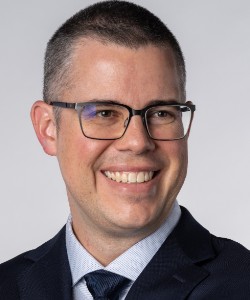
Patrick Tighe, MD, MS, is an associate professor of anesthesiology, orthopedics, and information systems/operations management at the University of Florida, Gainesville, and serves as the associate dean for artificial intelligence applications and innovations in the College of Medicine. He is supported by the Donn M. Dennis MD Professorship in Anesthetic Innovation.
Clinically, Dr. Tighe serves in the division of acute and perioperative pain medicine. His research activities, supported by the National Institute of Neurological Disorders and Stroke and the National Institute on Aging, use artificial intelligence
to better understand how perioperative factors influence postoperative outcomes, with special attention to pain, cognition, and social determinants of health.
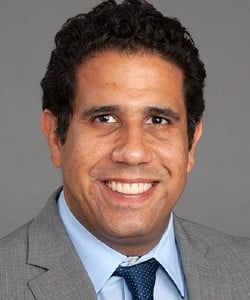
Reda Tolba, MD, is chair of the pain department at Cleveland Clinic Abu Dhabi, United Arab Emirates. He is a clinical professor of anesthesiology at Cleveland Clinic Lerner College of Medicine in Cleveland, OH. He is currently serving as the founding chair of the International Society of Pain and Neuroscience.
Dr. Tolba serves on several committees for ASRA Pain Medicine and North American Neuromodulation Society. He completed his residency training in anesthesia followed by fellowship in pain medicine at the Cleveland Clinic. He is board certified in anesthesia and pain medicine by the American Board of Medical Subspecialties.
He has published numerous papers and book chapters in the field of pain medicine. Dr. Tolba directed several workshops at international meetings such as American Society of Anesthesiologists and ASRA Pain Medicine. He has lectured extensively at variety of national and international meetings in the field of pain management. His special interests are the use of neuromodulation for the treatment of neuropathic pain, the management of vertebral compression fractures, and minimally invasive spine procedures.